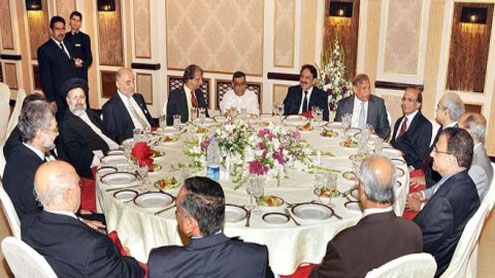
ISLAMABAD: The three-day International Judicial Conference, 2012, concluded here on Sunday with the adoption of “Islamabad Declaration”. It unanimously drafted a recommendation to be called “International Judicial Conference Declaration”.
The conference declared that all stakeholders should work together to uphold the rule of law in Pakistan. It recognised that Pakistan requires an objective mechanism to measure its adherence to the rule of law and it is declared that the World Justice Project’s ‘Rule of Law Index’ and the ‘Framework for Court Excellence’ be utilised in this regard.It declared that no other branch of government should be allowed to exercise either direct or indirect control over critical inputs of the courts in Pakistan. It declared that the effective management of the court system by court administrators will allow judges to focus on their adjudicatory duties rather than administrative responsibilities. It declared that the courts must continue to decide cases on merits in accordance with the law expeditiously, and ensure the execution and enforcement of decrees and orders effectively.
The declaration said that it is fundamental that honest and dedicated persons who share a strong commitment to the dispensation of justice be appointed as judges. It further recommended that all authorities act in support of the Supreme Court in accordance with Article 190 of the Constitution. It is imperative to enforce the fundamental rights of the people of Pakistan as encapsulated in Articles 9 to 28 of the constitution, in particular light of Articles 37 and 38 which provide guidelines for the promotion of social justice, eradication of social evils, and social and economic well-being of the people.
The conference declared that both terrorism and money laundering constituted a grave threat to the civilised nations throughout the world. Pakistani laws dealing with these issues may be brought in conformity with international standards as well as Pakistan’s commitments under various international legal obligations, it demanded.It further declared that all relevant bodies such as law enforcement agencies, prosecutors and presiding officers of the trial courts, be provided the necessary training and capacity building in dealing with these offences, and that “hawala/hundi” transactions to be discouraged, including over-invoicing and under-invoicing through effective regulatory mechanisms with surveillance.
It has also been emphasised that Pakistan should seek to strengthen its mutual legal assistance arrangements with various countries to ensure better coordination, information-sharing, timely and effective provision of support from the relevant law enforcement agencies operating in different countries.It recommended that the judiciary recognises that its primary duty lies in interpreting and implementing laws and not in the governance of society which may come about only as an ancillary effect of its decisions.
It is further recommended that the superior courts articulate a consistent and clearly defined doctrine of judicial review so that depending on the nature and context of the rights involved, relevant standards of review may be applied. The conference declared that the judiciary exercises judicial restraint so that it may not be perceived as excessively encroaching upon the roles and functions of the coordinate branches of the government. It proposed that a code of conduct may be devised for judicial officers and also be strictly enforced. – PT












